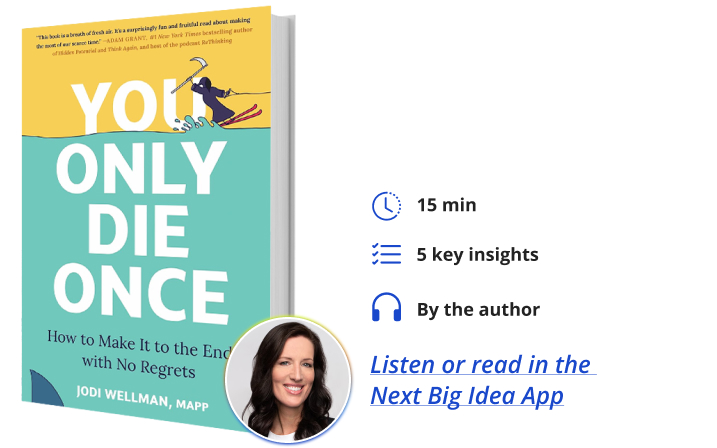Jodi Wellman founded Four Thousand Mondays to help people make the most of their one life. She is an Assistant Instructor in the master’s program for Applied Positive Psychology at the University of Pennsylvania, where she is also a facilitator in the Penn Resilience Program. Her TEDx talk, “How Death Can Bring You Back to Life,” has more than a million views.
Below, Jodi shares five key insights from her new book, You Only Die Once: How to Make It to the End with No Regrets. Listen to the audio version—read by Jodi herself—in the Next Big Idea App.

1. Death has a real knack for making life seem more valuable; scarcity can be a good thing.
We love the idea of “living like we mean it.” We drink coffee out of “seize the day” mugs, nod in earnest agreement that “you only live once,” and create fantastical bucket lists. We have such good intentions to make the most of our precious time! And yet, we often take our lives for granted. We think we’ll have time later, slip into autopilot, go through the motions, and suddenly another month has flown by. We’re often left feeling like we’ve missed out on our lives.
Paradoxically, chumming up with the Grim Reaper can wake us up and breathe more life into our lives. Reminding ourselves of our inevitable, no-way-out-alive, possibly imminent (but hopefully not immediate) death—well, that tends to snap people to attention.
Memento mori is an old Latin term that translates to “remember we must die,” and it’s based on the concept of temporal scarcity: as a resource becomes scarce, it increases in its perceived value. With temporal scarcity, we reflect on the time we have left when there’s an ending on the horizon—like finishing college, wrapping up a vacation, or the expanse of the lives we’re living. Framing an event, like the length of our lives, with an expiry date has been shown to make it feel much more valuable. Reminders of death translate into in-the-moment reminders of life, that it’s a scarce and precious asset worth preserving.
It’s time to count your Mondays. Take your average life expectancy (83 years for women, 78 years for men, and 80 if you don’t identify with either gender) and subtract your age. Then multiply by 52. This provides your average number of Mondays (or weeks) to either delight in or languish in your life. Let this be a powerful reminder of your countdown timer, and then let it motivate you to live with more urgency, gratitude, and zest.
2. Override your natural “death-denying” tendencies.
Denying the idea of death comes at a cost. While trying to put the lid on our thoughts about the big sleep, many of us experience anxiety, worry, depression, and negative emotions. Trying to quell death anxiety through avoidance ironically brews a batch of even more anxiety. Conscious and unconscious worries about death, if unaddressed, put a dent in our ability to show up fully for life. Denial exacts the price of a compromised inner life. A genuine understanding of our own mortality is seen to have profound psychological benefits and can be a prompt for growth, whereas fearing death can metaphorically kill us before we die.
“Trying to quell death anxiety through avoidance ironically brews a batch of even more anxiety.”
Death acceptance can provide a wonder-filled wake-up to life. Some academics note that acceptance of death rouses a sense of wonder, which flips the script on life and turns it into a game of figuring out our destiny. It’s not so much the big idea of death that scares us as the dawning awareness that we might reach the end of our lives and realize we never truly lived.
3. Intercept a “pre-gret”—a regret-in-the-making.
Most of us end up regretting things we didn’t do (regrets of omission), rather than things we did (regrets of commission). We can rationalize our regrets of commission through the softening of time but regrets of omission haunt us. Paths not taken shine a glaring spotlight on the chasm between our actual selves and the person we’ve imagined as our ideal selves—the versions of us that make dreams and goals come true.
Participating in the good old-fashioned deathbed regret exercise can help us. Imagine you’ve reached the end, and you’re looking back on your life. What might give you pangs of regret? That you didn’t see the Colosseum? That you didn’t spend more time with your grandkids? That you didn’t write that book? That you didn’t make up with your sister? That you weren’t bolder with your choices? That you didn’t learn to speak Italian? Identify one thing you’d kick yourself for not doing and take one action step to course-correct it. Identifying our regrets-in-the-making and course-correcting along the way to prevent them is a recipe for a life well lived, full of agency and intention.
4. Rumple up routines and shake things up.
Habits can provide feelings of control in lives that are uncontrollably terminal. But habits can also diminish our satisfaction with life over time, even if they feel good in the moment. There’s a natural tension between structure and agency, between habit and choice.
Succumbing to the same routine day after day and week after week numbs us into pseudo-satisfying trances that turn us into impressively functioning zombies. Living on autopilot can be comforting and efficient but also dull. Lifeless. Hollow. Unfulfilled. Uninspired. Deflated. All sorts of words we don’t want to use to describe our lives.
“The greater the variety in our day-to-day goings-on, the greater the happiness.”
The key is to mitigate the life-squelching effects of routines with variety and novelty. We must shake up the snowglobes of our lives. Novelty is the saving grace of a narrow life. It responds to the basic psychological need to experience newness and stray from well-worn paths. Research highlights the connection between the number of new experiences, the amount of novelty in our lives, and our positive emotional state. The greater the variety in our day-to-day goings-on, the greater the happiness.
Novelty-seeking acts like a booster shot to motivation. Exploring unfamiliar things jacks up our well-being and helps us function at our best. Variety is the spice of life, like trying a different kind of cuisine, varying your route to work to see new sights and hear new sounds, mixing up your usual Saturday morning routine, using the “good dishes” for pizza night, getting a makeover, or rearranging your furniture. What is one habit you can intentionally interrupt just for the sake of experiencing something new?
5. Widen your life with vitality and deepen it with meaning.
As much as we’d like to live longer, most of us agree that the preference is for quality over quantity—life in our years more so than years in our lives.
We widen our lives with vitality—a positive sense of aliveness and energy, our “health of spirit.” Vitality plays a massive role in boosting well-being and creating a life worth living. Embarking upon life wholeheartedly with anticipation and excitement, as though it was an adventure—this approach to living with zesty enthusiasm and energy predicts overall life satisfaction, work satisfaction, and the belief that our work is a calling. Zest-filled people are also more likely to believe their lives are meaningful. When operating in high-vitality mode, we’re more productive, more active, and perform better and more persistently. Where might you widen your life with more fun, pleasure, and experiences along this dimension of well-being known as hedonism? Maybe booking a trip somewhere new, hosting a game night with friends, playing the instrument you loved as a kid, taking a painting class, or arranging a six-course chocolate-tasting menu?
We deepen our lives with meaning—the eudaimonic counterweight to the hedonic-pleasure-zest-filled life. Meaning gives us a sense of significance, underscored by a belief that our lives are inherently valuable. Deepening your life includes feeling like you have some sense of purpose in your outstanding Mondays, connecting any of the dots in the universe to come up with some cohesive reason why you are here and why you are creating new spreadsheet tabs at work. Deepening your life also involves making connections to others, doing what you do best, having an orientation to something bigger than yourself, belonging, helping, and giving. To what extent do you feel you’re living meaningfully today?
Living the life you’ve imagined is entirely possible when you stop taking it for granted. Tomorrow isn’t a promise; it’s a premise. You only live—and die—once, so go live a life you’d be proud to look back on. Let’s count our Mondays and really make them count.
To listen to the audio version read by author Jodi Wellman, download the Next Big Idea App today:































